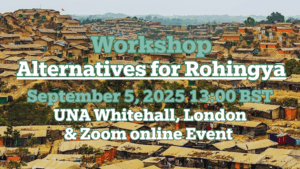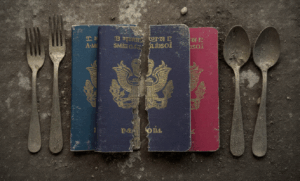War, as metaphor, has moved centre stage in recent months. National leaders, elected and unelected, have called for all-out war on a deadly virus that is invisible to the naked eye as it circles the globe, devastating lives, economies, political frameworks and business-as-usual politics. At the same time, actual warfare – violent armed conflict involving targeted and indiscriminate attacks on hospitals and use of improvised and other explosive weapons in residential areas – remains a deadly reality for millions. In New York, the United Nations Security Council (UNSC) is, effectively, missing-in-action as it fails to challenge the logic of war or help build the global collaboration needed to end the pandemic.
The use of war as metaphor is not new. It has many interesting precedents. Richard Nixon, in 1971, launched a war on drugs in the United States. A jihad, or war against landmines was an important programme in Afghanistan in the 1990s when the Taliban were in charge in Kabul. Shortly after the 9/11 attacks (2001), Washington announced an open-ended ‘Global War on Terror’. For over 60 years, the NGO War on Want has been fighting the root causes of global poverty and related injustices.
The use of war narratives can be counter-productive. Metaphors often obscure the real nature of the problem that needs to be addressed. Many wars end through negotiated settlements rather than military victories, but Covid-19 does not allow for compromise. War metaphors are oblivious to the fact that armed conflict, invariably, is a depraved, de-humanising, and soul-destroying affair. War raises questions about what it is to be human and to be part of a shared humanity.
War talk: camouflage for political failures
In the time of Coronavirus, politicians are using the language of war to bolster their plans to deal with the pandemic. This includes the mobilisation of support for vital public health measures and the infrastructure needed to maintain security and daily living. But militarised narratives are a poor substitute for a sound understanding of the drivers of the pandemic, not to mention its direct and long-term implications for those who are most at risk and least able to resist its consequences.
The virus is a menace to people and societies everywhere. But, it is important to acknowledge that the pandemic is largely the outcome of the decisions and actions of humans that have, effectively, declared war on nature, created the climate crisis and devastated our eco-system. It is the pursuit of policies that prioritise profit over people while manufacturing growing levels of inequality and social injustices that have helped build this pandemic. Although the virus is routinely described as an ‘invisible killer’, the pandemic is also the result of political choices that ravaged health care systems in keeping with recession-led austerity measures and decades of unregulated marketplace economics.
The US, with 4.25% of the world’s population, has some 30% of the world’s (recorded) death count of Covid-19 (as noted in The Guardian on 10th May), given, in part, the nature of the tardy response and the limited availability of affordable health care in poor communities.
Between 2010 and 2019, the Italian national healthcare system suffered cuts amounting to some US$45 billion. Coupled with significant privatisation, this was a key factor in Italy having one of the highest death tolls in May 2020 according to The Lancet. The World Health Organisation (WHO) advised in September 2019 that most countries were “under-investing in primary health care” and the biggest gaps in health care system funding were “in the poorest countries and those affected by warfare.”
Many countries, rich and poor, have not prioritised health and other services essential for the safety and wellbeing of all. This has translated into bidding wars for basic protective supplies for medical and other personnel in different Covid-19 hotspots in recent months. By contrast, military spending has been on a continuous upward trend in recent decades.
The US military-industrial complex in 2019 amounted to some US$750 billion. This is almost 100 times the US$8 billion allocated to the Centre for Disease Control and Prevention (CDC) that lost 80% of its global disease-fighting budget in 2018. Globally, military expenditure, including that of the five biggest spenders – the US, China, Saudi Arabia, India and France – amounted to a staggering US$1.8 trillion in 2018, the highest since 1988, according to SIPRI, the Stockholm International Peace Research Institute.
Such massive investment in war-making machinery reflects, in part, a changing geo-political order, decreased multilateralism, significant unraveling of arms control processes and failing or ineffectual use of diplomacy to resolve disputes. In this dog-eats-dog universe, armed conflict has continued without mercy while peace negotiation processes have slowed.
Armed conflict, unhindered
War, as noted by much-quoted von Clausewitz, is a continuation of politics by other means. This is amply demonstrated by the many feuds that continue to paralyse the UNSC. In recent weeks it has failed to agree on a resolution backing the UN Secretary General, António Guterres’ call on 23rd March for “an immediate global ceasefire in all corners of the world.” A number of non-state armed actors such as the ‘Southern Defense Force’ militia in Cameroon and the New People’s Army in the Philippines did down arms, albeit temporarily. The Permanent Five (P5) members of the SC however declined to give peace a chance or work together to put armed conflict on lockdown. Instead, the US and China have drawn swords over wording in a draft resolution that makes reference to WHO’s role in the pandemic: Washington objects to any affirmation of support to an institution it no longer funds and growing geo-political rivalries amplify its many disputes with Beijing.
While multilateralism flounders, the arms trade flourishes and warfare proceeds unhindered. According to SIPRI, the global arms trade is booming. Sales are 23% higher now than ten years ago. The UNSC P5 veto holders and their allies dominate the arms trade. The US has “solidified its position as the world’s leading arms supplier”reports SIPRI. The US, Russia, France, Germany and China were, together, the five largest exporters and accounted for 75% of global arms sales in the 2014-2018 period.
The UK, the US and France are the largest suppliers of military equipment to Saudi Arabia. As noted in a classified French Military Intelligence document, the Saudi-United Arab Emirates coalition is “overwhelmingly dependent on Western-produced weapons” to wage war in Yemen. In the UNSC, Riyadh has enjoyed the support of “its key allies and arms suppliers, the US, the UK and France” since the outbreak of hostilities in 2015, according to the Sana’a Center for Strategic Studies.
The dysfunctionality of the UNSC is ever more apparent as is the hypocrisy inherent in its internal contradictions and the extent to which competing interests cancel consensus on vital initiatives. It is increasingly difficult to envisage existing inter-state structures engaging in the type of solidarity and cross-border collaboration that is needed to face down Covid-19. Collaboration is no less needed to face up to the ramifications of the pandemic for people at risk in war zones that stretch from Afghanistan to Yemen, from Somalia to Kashmir, Myanmar, Syria and the Sahel, to name just a few.
Blinkered border politics
Viruses, by their very nature, operate sans frontières as they infect new human hosts. Efforts to thwart viral transmission have included different versions of ‘lockdown’ that are frustrating for many but extremely difficult for poor families confined to one-room dwellings in over-crowded slums. For millions of war-affected and up-rooted people, closed borders mean that the ability to escape, relocate or seek safety is severely compromised; this can make the difference between life and death.
Pre-pandemic trends of ever-tighter border restrictions and hostile, anti-migrant far-right politics have gained ground. Some governments have used public health regulations to further inhibit the movement of bona fide asylum seekers and other migrants as well as the activities of non-governmental groups attempting to be of help. The blanket closure of ports to NGO Search and Rescue vessels, heavy with people plucked from the Mediterranean,is unlawful. Governments intent on shirking their international law responsibilities are adding to the human costs of wars they often help facilitate.
The pandemic has seen states and societies ramp up efforts to save lives by ensuring the availability of essential health care, transport and other workers as well as related services. Simultaneously, however, the movement of people who need to flee to hold on to their lives has been deliberately made more dangerous.
Building a new normal that rejects inhumanity
Many lessons can be distilled from the politics that led to the pandemic and its catastrophic consequences. Lessons can also be garnered from the immediate and underlying reasons of the human cost paid by those who were most at risk, as well as the actions taken and not taken to deal with the contagion.
Covid-19 has once again exposed the behaviour and questionable legitimacy of the UNSC. The P5 veto shows, in stark relief, that the UNSC is unfit for purpose. It negates the moral aspirations of the “We the Peoples” agenda and architecture of the multilateral system established in the wake of the inhumanity of WWII. It is time for citizens everywhere to challenge this undemocratic anachronism especially for situations of mass atrocity. Obliging P5 members to abstain from voting when debating conflicts they are directly involved in, or profit from arms sales, could be a useful place to start.
The trillion plus US$ that are invested annually in the arms trade and militarised agendas helps fuel violent conflict and the devastation of health care and other essential services in war zones, while reducing resources for education and other such social purposes elsewhere. The mad scramble for face masks, ventilators and vital testing equipment are testimony to skewed and immoral decision-making. To state the obvious, from any perspective building healthy environments as well as essential medical capabilities should take precedence over the production of bombs and bullets.
The pandemic is another reminder that the state of the global asylum regime is an affront to notions of a civilised world. The growing number of people who flee in search of safety reflects, in part, the nature and extent of violent conflict and the type of politics that has turbo-charged the arms trade and, coincidentally, the rapid spread of Covid-19. Yet, national pandemic control arrangements – with a few notable exceptions such as Italy and Portugal that have granted all migrants, including asylum seekers, temporary residence rights for the duration of the crisis – have failed to acknowledge that nothing is more essential than the ability to flee violent conflict when one’s life depends on it. While many governments have lacked vision and compassion in this time of unprecedented crisis, citizens from all walks of life have spontaneously banded together to provide support while also advocating that national and local authorities deliver on their responsibilities.
Building a world opposed to the creation of pandemics and other catastrophes that wipe out multitudes needs a dramatic rethink of what makes us human and the nature of transnational solidarity.
Citizens need to engage in building the world they wish to live in. The pandemic has brought to the fore the disruptive and dangerous nature of East-West relations and hollowing out of the so-called international community. Globalisation continues apace while the US embraces isolationist tendencies at odds with its struggle to maintain its hegemonic attributes. In a time of rising populism, my-country-first nationalism, xenophobia and beggar-thy-neighbour foreign policies, citizens need to figure out how best to engage. We all have a key role to play. It is up to us to choose and push for a new normal. This means working against ‘might-makes-right’ politics and promoting collaboration within and across borders to secure a more sustainable and peace-loving world. This is the terrain where UAI wishes to position itself. The urgency of the task requires a “all hands on deck” mentality. Challenging inhumanity was never more vital.
This Opinion piece was penned by Norah Niland, a UAI Executive Committee founder and member
Views expressed in this opinion piece do not necessarily reflect those of UAI.
Photo credit ©Cnvschq











